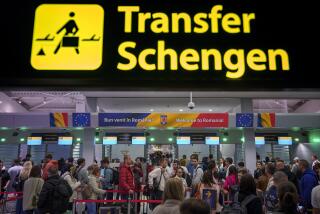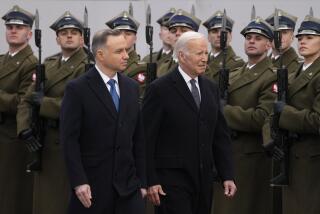Bulgaria, Romania Pin Hopes on U.S.
- Share via
WASHINGTON — From Paris and Berlin, the U.S. troops flowing toward the Persian Gulf these days look like the menacing might of an overbearing superpower.
From Sofia and Bucharest, they look like the business opportunity of a lifetime.
While France and Germany have been digging in to stop a U.S. campaign against Baghdad, Bulgaria and Romania have been doing all they can to support it, convinced that helping rich America with an unpopular war can enable them to realize their long-delayed dreams of joining the Western economic mainstream.
By taking their stance early and publicly, the two Eastern European nations have become a target of ridicule for some, members of President Bush’s “coalition of the willing” that one U.S. senator sneeringly said is “more like a coalition of the bought.” They have risked diplomatic retaliation -- and even terrorist attack -- from those who oppose the war.
Their story is a revealing example of how wealth and power have helped the United States win valuable international support, sometimes without having to try very hard. The same sort of rewards beginning to flow to Bulgaria and Romania are on the table again as the United States battles to win passage of a U.N. Security Council resolution authorizing the use of force against Iraq.
Since Europe began picking sides in the transatlantic battle over Iraq, these two impoverished countries on the eastern fringe of the Balkans have offered Washington military bases and ports, overflight rights, chemical and germ weapon protection units, and more.
Bulgaria, once a staunch ally of the Soviet Union, has been one of only three members of the Security Council, along with Britain and Spain, that have consistently supported beleaguered U.S. diplomats.
While American troops have been ringed with hostile antiwar picketers at bases in Germany, Romania has welcomed them as liberators and lodged them in Black Sea resort hotels.
“In principle, everything we have is available to the United States,” said Sorin D. Ducaru, the Romanian ambassador to the U.S.
The Bush administration has signaled that it will do what it can in return.
President Bush last month sent Commerce Secretary Don Evans to the two countries to thank them for their support -- and to drum up American investment and promote their efforts to win official designation by the U.S. as “market-based economies.”
“I bring the appreciation of the American people for this country’s support at this decisive moment in the history of the world,” Evans said in Sofia, the Bulgarian capital. “America is going to stand by your side, shoulder to shoulder. We are going to do everything we can to strengthen the economic relationship between our two countries.”
U.S. officials have promised to help the countries collect on the $3.4 billion that together they are owed by the Iraqis, and to give them a shot at lucrative contracts to redevelop Iraq after the war.
The officials also have broached the possibility that the U.S. could someday move some of the 70,000 American troops stationed in Germany to new “expeditionary” bases in Bulgaria and Romania -- a potential windfall for the Balkan states.
Later this month, the Senate is to begin considering the applications of Romania, Bulgaria and five other countries to join the North Atlantic Treaty Organization.
For Romania and Bulgaria -- among the slowest Eastern European nations to recover from their Communist past -- the opportunity offered by the war came not a moment too soon. They missed out in the early 1990s when a post-communism economic surge began a revival in other former Warsaw Pact countries, such as Poland and Hungary.
“They were still struggling under corrupt governments and didn’t share in the first wave,” said Bruce P. Jackson, president of the U.S. Committee on NATO, which has lobbied to win Eastern European countries membership in the Western alliance. When Yugoslavia ignited in a series of civil wars, “they found themselves trapped on the wrong side of the Balkans,” he said.
And more recently, as they have moved to reform their economies and governments, Western investment in the region has dried up.
The two countries showed interest in joining NATO and strengthening ties to the West by offering military help during the Kosovo war in 1999 and the Afghan conflict two years later. In the Afghanistan war, Bulgaria offered basing rights -- the first time it had invited a foreign power to use one of its bases. Romania even sent a combat unit, the “Red Scorpions,” via surplus American C-130s.
They were also among the first nations to step forward with offers of help for the U.S. after the Sept. 11 attacks. They contacted the White House on Sept. 12 to offer not only sympathy but also intelligence, overflight rights, airfield access and other help for the new war on terrorism.
The offers “had a huge personal effect on President Bush,” said Jackson, who was a defense official during the Reagan administration and is close to top Bush administration officials.
For the war expected against Iraq, Romania has offered the United States the use of three airfields in the eastern end of the country, two of which are on the Black Sea. Bulgaria has again offered the use of a base, the airfield at Burgas.
Elena Poptodorova, the Bulgarian ambassador to Washington, said that since her nation and the U.S. established diplomatic relations 100 years ago, “never has the relationship been so good.”
The Romanians are even more effusive about the budding relationship they have long yearned for.
Ambassador Ducaru says Romanians hope the new partnership will liberate the country from its recent past, just as U.S. forces liberated Western Europe from the Nazis at the end of World War II.
When the Americans freed Western Europe, “it didn’t happen for us. But now the job will be finished,” Ducaru said. “There is a desire in Romania to be on the right side of the world -- to be again a part of the family.”
He said Romanians share the Bush administration’s dislike of Iraqi President Saddam Hussein, whom they view as another Nicolae Ceausescu, the Romanian dictator executed in the revolution of 1989.
“The Romanians had the toughest regime in Central Europe,” Ducaru said. “They believe the issue of Iraq is not just about security but about values.”
The two Balkan nations’ pro-American stance has exposed them to some risk.
Both hope to join the European Union in 2007. But last month, French President Jacques Chirac warned that their open support for the United States effort was “particularly irresponsible.”
“If they wanted to diminish their chances of joining Europe,” said Chirac, “they could not have found a better way.”
The comment hit hard in Romania, which was historically France’s strongest ally in the region. Romanian President Ion Iliescu acknowledged publicly that the country was caught uncomfortably between the two sides.
In Bulgaria, the reaction to the criticism was “spontaneous and strong,” said Poptodorova, the ambassador. The nation’s citizens suffered from intolerant Soviet attitudes during the Warsaw Pact days, she said, “and that’s what made it even more resented.”
The Bulgarian government’s pro-American stance is not universally popular at home. Ethnic Turks make up about 10% of the population and are more sympathetic to Iraq.
There are differing points of view among top politicians as well. President Georgi Parvanov is less enthusiastic about cooperation with American plans than Prime Minister Simeon Saxe-Coburg-Gotha, the nation’s former king.
The two countries’ pro-American position has exposed them to threats of a more dangerous kind from the Iraqis.
Yahia Mahdi, the Iraqi charge d’affaires in Bulgaria, said during a visit to the city of Burgas on Wednesday that “any U.S. base used for aggression against Baghdad will be the target of Iraqi revenge, irrespective of where it is in the world.”
Bulgarian officials warned him to tone down his rhetoric. But they have asked U.S. officials for help protecting the country against attacks that may be launched because of the war preparations.
Last week, Bulgaria ordered its diplomats out of Iraq for security reasons, saying it feared they could be taken hostage or attacked. And over the weekend, Romania expelled five Iraqi diplomats for “activities incompatible with their status” -- diplomatic jargon for spying.
Despite these risks, Bulgaria and Romania say they remain ready to help the U.S., especially if the Americans will help them with development.
The countries say they have a lot to offer U.S. firms, starting with labor that costs on average a scant $117 a month in Bulgaria and $115 a month in Romania.
Romanian Prime Minister Adrian Nastase insisted last week that Romania would not “blackmail” its friends and partners.
“We offer our support because we believe in it,” said Ducaru, the ambassador.
“And of course, we’re counting on the United States to support us on the issues that we have.”
More to Read
Sign up for Essential California
The most important California stories and recommendations in your inbox every morning.
You may occasionally receive promotional content from the Los Angeles Times.











